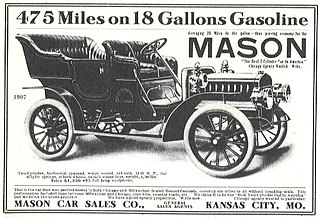
The Overland Automobile Company was an American automobile manufacturer in Toledo, Ohio. It was the founding company of Willys-Overland and one of the earliest mass producers of automobiles.

The Liberty Motor Car Company was a vintage era United States automobile maker based in Detroit, Michigan from 1916 to 1923.

The Saxon Motor Car Company was located in Detroit, Michigan, from 1914 to 1922. In 1917, 28,000 cars were made, making it the seventh largest car maker in the United States.

The Terraplane was a car brand and model built by the Hudson Motor Car Company of Detroit, Michigan, between 1932 and 1938. In its maiden year, the car was branded as the Essex-Terraplane; in 1934 the car became simply the Terraplane. They were inexpensive, yet powerful vehicles that were used in both town and country. The Terraplane name was used for both cars and trucks.

The Stutz Motor Car Company was an American automobile manufacturer based in Indianapolis, Indiana that produced high-end sports and luxury cars. The company was founded in 1911 as the Ideal Motor Car Company before merging with the Stutz Auto Parts Company in 1913. Due to the pressures of the Great Depression, the Stutz company went defunct in 1938. The Stutz Motor Car Company produced roughly 39,000 automobiles in their Indianapolis factory during their existence.

Stevens-Duryea was an American manufacturer of Veteran and Brass Era automobiles in Chicopee Falls, Massachusetts, between 1901 and 1915 and Vintage Cars from 1919 to 1927.
The Calthorpe Motor Company based in Bordesley Green, Birmingham, England made a range of cars, motorcycles and bicycles from 1904 to 1932.

Barley Motor Car Co. was a manufacturer of luxury automobiles in Kalamazoo, Michigan, and Streator, Illinois. It manufactured the Roamer automobile (1916–29) and briefly, the Barley (1922–24), and the Pennant (1924–25).

Mercer was an American automobile manufacturer from 1909 until 1925. It was notable for its high-performance cars, especially the Type 35 Raceabout.

The Standard was an American automobile manufactured in Butler, Pennsylvania from 1914 until 1923 by the Standard Steel Car Company.

The Staver and Staver-Chicago was an American Brass Era automobile manufactured at 76th and Wallace Streets in Chicago, Illinois, by the Staver Carriage Company from 1906 until 1914.
Spaulding was used as an automobile marque by two separate companies. The Spaulding Automobile and Motor Company of Buffalo, New York built Veteran Era automobiles in 1902 and 1903. Spaulding Manufacturing Company of Grinnell, Iowa built Brass Era automobiles from 1910 to 1916.

The Speedwell Motor Car Company was a Brass Era American automobile manufacturing company established by Pierce Davies Schenck that produced cars from 1907 to 1914. The Great Dayton Flood of 1913 greatly damaged the Speedwell factory and inventory, and the company entered receivership in 1915 after having built an estimated 4,000 cars and trucks.

The Moline Automobile Company, was an American brass era automobile manufacturer in East Moline, Illinois known for the Moline, Dreadnought Moline,Moline-Knight and R & V Knight marques.

Nyberg was the name of a brass era American automobile built by Henry Nyberg of Chicago, Illinois, in Anderson, Indiana, and Chattanooga, Tennessee from 1911 to 1914.

The Matheson was a luxury American automobile manufactured from 1903 to 1912, first in Grand Rapids, Michigan, then Holyoke, Massachusetts and from 1906 in a purpose-built factory in Forty Fort, Wilkes-Barre, Pennsylvania.

Daniels Motor Company was a pioneer brass era American automobile company, founded in 1915 by George E. Daniels with Neff E. Parish. George Daniels was a known lawyer, engineer, and mechanic. He was considered the best motorcar designer in the United States. Neff Parish had his own automobile parts and framing manufacturing company. Neff was the creator of the time's highest-grade heat-treated alloy steel frames, respected in the steel industry. Daniels Motor Company produced 1,500 high-quality automobiles between 1916 and 1924, branding themselves as “the distinguished car with just a little more power than you will ever need”, and “The aristocrat of American cars”.

Mitchell was a major brass-era automobile marque in Racine, Wisconsin, from 1903 to 1923.

H. C. S. Motor Car Company was a short-lived Indianapolis, Indiana, automobile manufacturer. It may have built as many as 3,000 cars between the summer of 1920 and 1926, when its doors were closed by its creditors.

The Mason was a Brass Era automobile manufactured in Des Moines, Iowa from 1906 to 1909 and Waterloo, Iowa from 1911 to 1914. In 1909 and 1910 it was marketed as the Maytag-Mason.






















